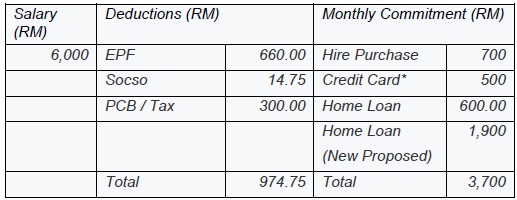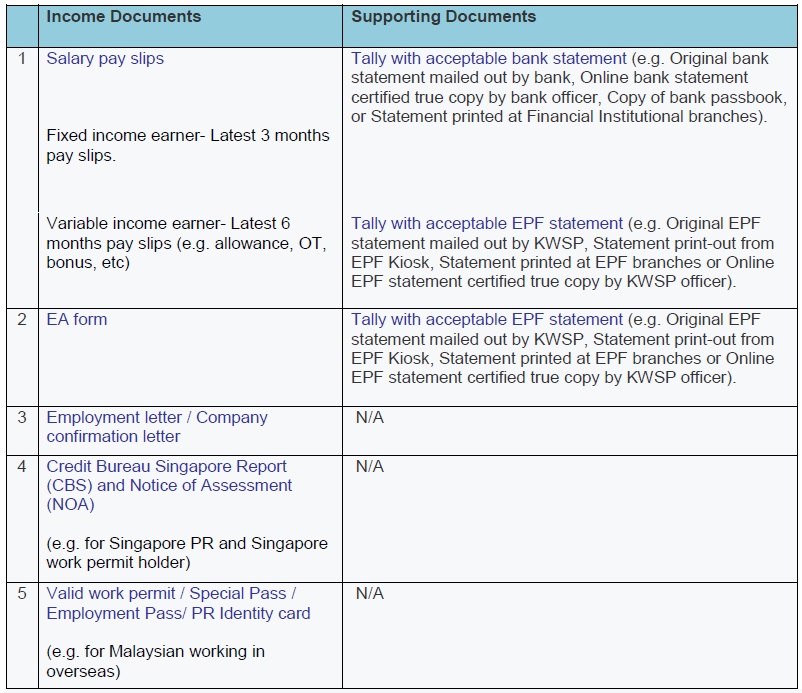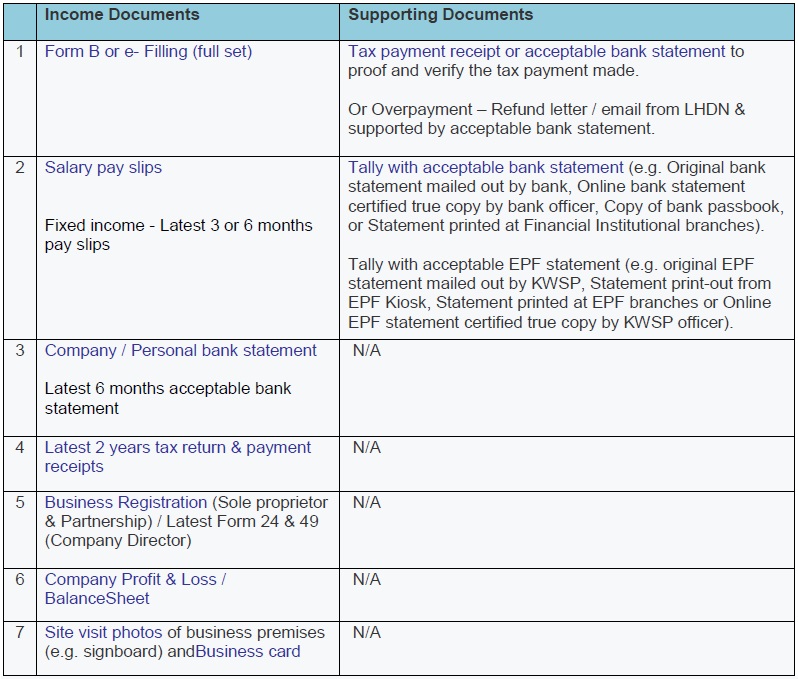
Peranan sekatan kepentingan dalam setiap transaksi hartanah
Dalam transaksi jual beli hartanah, sekatan kepentingan atau 'restriction-in-interest'...

We are the exclusive marketing partner of LelongTips.com.my.
We display updated listings of auction properties in Malaysia and provide FREE assistance service for enquiries by telephone or online. Our below market value listing would benefit your property investment as well as for your own use.

Buying a house isn't easy. Sometimes
you can feel like a dizzying set of guidelines and procedures, especially now
banks have tightened up their lending rules as non-performing loans have
increased. Because of this, it's important to find out why your loan
application was denied. Here are some common reasons why your loan request can
be denied.
1.
Application Scoring Systems
The banking industry has embraced the
use of advanced technologies to serve its customers more quickly and with
greater accuracy. One of the major changes that has occurred in the banking
industry is the utilization of computers to underwrite mortgage loans. In the
past, traditional underwriting process was performed by humans. However, as
with many functions, computers can perform these functions faster, more
accurately, and can also reduce human error or negligence in the underwriting
process.
Application scoring is a system used
by banks to determine the risk grade and decide how much to lend to customer.
Whenever the bank officer receives a loan request, they will enter customer's
personal information into the application scoring system, which analyses the
customer's profile such as customer's age, education level, marital status,
occupation, income, nature of business, etc.
Each fact will be given points based
on information that have provided by applicant, all the points are added
together to give a score. Different banks have different underwriting
guidelines to work out application scores.
a) Occupation
There are a number of factors that a
financial institution will take into account when they consider your
application for a mortgage loan, and it has been proven that occupation has
been one of the important factors when evaluating your loan application.
In numerous sectors of the employment,
we can say that an organizational structure is broadly divided into two major
categories as white collar and blue collar workers. The following are the
differences between white collar and blue collar workers:
White collar worker - Person who performs professional,
managerial, or administrative works e.g. manager, administrative executive,
engineer, doctor, lawyer, pharmacist, appraiser, pilot, judge, accountant,
university lecturer, etc
Blue collar worker - Person who performs manual labor
works at the work place, e.g. technician, restaurant cook, driver, waiter,
manufacturing or production operator, maintenance worker, constructions worker,
installation or repair worker, gardener, beautician, hairstylist, etc.
b) Nature of the business
Banks will look at the sector or
industry you are employed and whether is it especially exposed in economic
recession. And also the overall market conditions or fluctuation may affect
certain sectors or industries such as oil & gas, transport & logistics,
airline, etc.
It is worth mentioning that there are
some of the borrowers from certain sectors or industries had a poor payment
records in the banking system, so banks will reject the loan application if
there is a loan request from the same sectors or industries, based on past
history summary and analysis.
Case 1:
Mr. Simon (white
collar worker) and Mr. Alex (blue collar worker) are applying for a mortgage
loan to purchase a property at the same time to the same bank, and had the same
income. Each bank has their own specific criteria for who they are willing to
lend to and bank has a guideline of calculating the scores, so it could be under
two different results as below:

This is because some of the banks
believe that if there is a financial crisis or global recession occurs, the
white collar workers are more confident to find a new job, and it’s also
according to statistical analysis based on past banking data.
Remark: Employment stability is important as
most banks prefer borrowers to be with their current employment for at least
three or six months and not on a probationary period if possible.
(adsbygoogle = window.adsbygoogle || []).push({});
2. Personal Credit Report (CCRIS)
CCRIS stands for Central Credit
Reference Information System created by Bank Negara Malaysia (BNM). All
participating financial institutions in Malaysia are required to submit a
monthly credit report of all their borrowers to the Credit Bureau Malaysia, all
the credit information that have been collected is stored in a computerized
database system known as the Central Credit Reference Information System
(CCRIS) which contains credit information on about 9 million borrowers in
Malaysia.
CCRIS automatically processes the
credit information received from the participating financial institutions and
compile it into reports consistently, make it available to the financial
institutions upon request.
a) A CCRIS report consists of the following credit information:
(i) Outstanding Credit:
- All credit facilities information
including outstanding balances and credit limits (e.g. home loan, credit card,
hire purchase, personal loan, etc),
- Payment history records but only the
last 12 months of payments appear in credit report (fully settled credit
facilities are excluded from the report.)
(ii) Special Attention
Account
(iii) Application for
Credit:
- All applications made in the past 12
months
CCRIS report is a summary of your
credit payment history and banks will use your CCRIS report when evaluating
your credit risk and deciding whether or not to approve you for loan.
b) Perbadanan Tabung Pendidikan Tinggi Nasional (PTPTN)
There are a total of 1.25 million
borrowers who failed to repay their PTPTN loans have been listed on CCRIS
beginning 2015. If you don’t pay your PTPTN loan, it can quickly damage your
credit score. A good credit score record can make it possible to buy your dream
home or car, so the best way you can do is make payment on time to improve your
credit scores.
c) Special Attention Account
Credit facilities under the close
supervision or monitoring by the financial institutions, such as Non-Performing
Loan (NPL) or credit facilities under the AKPK’s Debt Management Program (DMP).
AKPK stands for Agensi Kaunseling dan
Pengurusan Kredit, also known as Credit Counselling and Debt Management Agency.
An agency was set up by Bank Negara Malaysia (BNM) to help individuals who are
facing difficulties servicing their outstanding debts as well as financial
counselling help individuals take control of their financial situation and gain
peace of mind that comes from the wise use of credit.
The AKPK counsellors will work with
the borrowers to develop a personalized debt repayment plan and resolve
financial problems with the financial institutions.
Generally speaking, bank will not
approve application for those under Special Attention Account.
d) No payment history on CCRIS (Zero CCRIS)
If you do not have any payment history
record, it can affect your credit score. This may seem unfair, but the reason
is that you have not established past payment history to show that you have the
discipline to make payment, banks look for a consistent history of paying your
loan on time.
Case 1:
Mr. Lee began his
career as a software engineer for a multinational company after graduation. He
has been promoted to manager within a short period of time, his monthly salary
has been increased from RM 3,500 to RM 6,000, and he started making enough
money to splurge. Meanwhile, he has three credit cards with higher credit
limits, and he started spending money on luxury products and unnecessary
things. Because of his attitude, he's owed more than RM 30,000 within a year
and failed to make the credit cards payment on time.
One year later, Mr.
Lee and his wife decided to buy an apartment, they have applied loans with
different banks. Unfortunately, all applications have been turned down because
of an unsatisfactory credit history.
Case 2:
Madam Chen has more
than 10 years of experience in the stationary trading business, and she intends
to expand her business into other areas. However Madam Chen needs some extra
cash to increase her capital and to expand her business, thus she decided to
apply for a loan from banks. One week later, she received a letter saying that
the loan has been denied. She was surprised by the result and was informed by
the loan officer that she has been blacklisted for being a guarantor to
borrower who defaulted on payments.
As cases mentioned above, we can
realize that it's so important to manage your creditworthiness, usually bank
will determine your creditworthiness based on your credit report. It's a good
idea to have your credit report before you start your loan application, so you
have time to find out and fix any mistakes on your credit report.
Check your credit report at http://www.propertyavenue.com.my/personal-credit-report/
3.
Debt Servicing Ratio (DSR)
Debt Servicing Ratio (DSR) is the
percentage of a borrower's monthly net income that is spent on debt payments,
and provides an estimate amount that you may be able to borrow. Banks use the
Debt Servicing Ratio to measure your ability to manage the debts, with a low
Debt Servicing Ratio shows you have a good balance between debt and income.
Banks want to make sure that you can afford to pay them back and you’re not
overwhelmed with too much debts before they give you a loan. This also may
reduce the bad debts or Non-Performing Loans (NPL) ratio.
To know your Debt
Servicing Ratio = Total Monthly Commitment /
Monthly Net Income
Each bank has its own set underwriting
criteria and guidelines to determine borrower’s net income and also maximum
allowable DSR, even if you’re rejected by one bank, but you might not be
rejected by others. For your information, you may refer to the guidelines as
below:
Examples:

Case 1:
Mr. Albert, Account
Officer.

Credit card
commitment calculation = Outstanding amount x 5%
DSR % = Commitment /
Net Income
Monthly Commitment:
RM 3,700
Monthly Net Income:
RM 5,025
DSR: 73.63 %
Mr. Albert mortgage
loan application results as below:
Bank M: Loan has been
rejected (DSR more than 70%)
Bank R: Loan has been
approved (DSR within guidelines, less than 75%)
4.
Income Documents and Supporting Documents
When applying for a mortgage loan,
banks will need proof of income to ensure that you have sufficient monthly
income to cover your mortgage loan payments and will consider your total
monthly income from all sources e.g. include salary, OT, bonus, allowance,
rental income, dividend, etc. Your current income will also be a significant
determining factor in loan approval.
Banks will want to see that you're
currently working, it is a very important step in determining the eligibility
for a loan. Most of the documentation should be similar if you have applied to
several banks, so you should prepare all your documents as early in the process
as possible.
Below are some of the basic documents
that you’ll need to prepare to effectively get your loan.
If you’re employed,
you’ll also need to prepare the following documents:

If you’re self-employed,
you’ll also need to prepare the following documents:

Other / Additional
Income Documents:

5.
Bankruptcy
Bankruptcy is the legal procedure for
a person unable to pay off his outstanding debts of at least RM30, 000.00, it
is a status that can only be granted by court.
Once a person has become bankrupt
(bankruptcy order is made by the court), the Director General of Insolvency
(DGI) will become the administrator of his assets or properties, and will repay
or distribute fairly to the creditors once the assets or properties are sold.
Most of the banks would not even consider lending money to someone with
bankruptcy.
6.
Credit Information provided by Credit Reporting Agencies (CRA)
Banks might want more information than
just CCRIS banking payment history before approving a mortgage, including
credit information from third party data. Banks will carry out a credit
assessment of the borrower from various sources, such as credit information
provided by the Credit Reporting Agencies (CRA) registered under CRA Act,
namely RAM Credit Information Sdn Bhd, CTOS Data Systems Sdn Bhd, Credit Bureau
Malaysia Sdn Bhd, FIS Data Reference Sdn Bhd, BASIS Corporation Sdn Bhd and Dun
& Bradstreet (Malaysia) Sdn Bhd.
Credit Reporting Agency (CRA) is a
company that collects and analyzes credit related information on individual
consumers or on businesses for variety uses. The data are collected from
various sources, while CRA offer many services to the public and companies that
seek consumer information.
Lending industry is a risky business.
Basically, the lending institutions like banks, motor vehicle dealers,
telecommunication companies, and other creditors will use all available credit
information to help them make their lending decisions. Lenders will determine
your creditworthiness based on your credit report as they need to minimize risk
as much as they can.
The Credit Reporting Act 2010 promotes
fairness, accuracy and privacy in the practice of creditReporting, and you have
the right to access your credit report to verify the accuracy of information
reported in your credit report. For your information, the Credit Reporting
Agency is not allowed to contain information about the individual bankruptcy
status two years after the date of discharge of bankruptcy or the date of final
settlement.You may check your report from credit reporting companies.
Case 1:
Mr. Kumar graduated
from Aviation Maintenance Academy two years ago, and currently working as an
aircraft maintenance engineer. He decided to buy a house with his fiancée
before getting marriage. Unfortunately, his loan application has been declined,
and he found out that he has been blacklisted by a motorcycle dealer who offer
in-house finance to him. He purchased the motorcycle with that dealer when he
was studying at university, and he failed to make full payment to the dealer
after graduation.
Case 2:
Ms.Siti was unable to
get home loan because of her blacklisted status. She has been blacklisted by
telecommunication company due to there is an outstanding balance of RM 600 on
her account which registered since 2009. Finally, she had realized that her
brother used her name to register an account with that telecommunication
company.
Generally speaking,
it’s important to have a positive credit history, the better your credit
history, the more likely to lend you money.
7.
Developers& Sellers Background / Negative Factors & Area
Having a good credit score and stable
job or good income are the primary factors that banks will look for when you
apply for a mortgage, other than that, banks will also take into consideration
the developers and locations you have chosen.
a) Under Construction Property Projects
It's important to make sure you are
buying from a reputable developer as there’s threat of a developer failing to
complete construction (abandoned projects) within the timeframe.
For under construction property
projects, the developers are required to submit end-financing / empanelment (an
arrangement with a project developer to provide financing to the buyers)
documents to the banks that they wish to apply before banks can provide
financing to the buyers. In other words, the home buyers can only borrow money
from the approved end-financier or panel banks.
The main criteria or guidelines of
evaluating for end-financing / empanelment process would be:
- To have a background search on the
developer, and check any prior projects that they have built in the past,
- Company’s director profile search,
- Company financial status,
- Project viability and location,
- Project price assessment,
- Any negative factors may affect the
marketability of the projects, etc.
For those blacklisted developers had a
poor track record usually unable to get EF approval from banks. Some
problematic housing developers have been blacklisted by the Housing and Local
Government Ministry, you may check at: http://ehome.kpkt.gov.my/index.php/pages/view/43
b) Completed Property
Typically for sub sale or sub purchase
properties. The mortgage loan officer will seek for verbal opinionand obtain a
fair indicative market value from panel appraisal / valuer when receives a loan
request from borrower. If the property is close to the negative factors or in
the negative list area (each bank has their own listings), it will affect the
property market valuation. At the same time, banks will also consider the
following negative factors into account, such as:
- Facing junction,
- Close to oxidation pond, sewerage
pond, rubbish dump, grave yard, high-tension cable, etc,
- Flood prone area,
- Hill slopes area,
- Renovation or extension to the
property without local authority approval,
- Property structures (e.g. wooden or
half-brick houses),
- Leasehold properties with remaining
lease less than 40 years (different banks have different criteria)
- Other factors which may affect the
marketability of the property, etc.
Remark: If a seller is bankrupt or under
bankruptcy proceeding status, the loan also can be rejected, it is because the
court will appoint the Director General of Insolvency (DGI) to administer the
bankrupt’s assets or properties in order to settle the outstanding debts to his
creditors.

Dalam transaksi jual beli hartanah, sekatan kepentingan atau 'restriction-in-interest'...